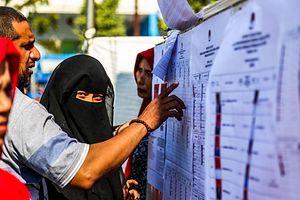On the northernmost point on the island of Sumatra, Aceh’s dark and troubled past has been a volatile mix of conflict, natural disasters, and religious conservatism. After the 2004 Boxing Day tsunami killed more than 100,000 people in Banda Aceh alone, conflict in the region came to a standstill between the Aceh rebels and the Indonesian military. In an agreement, the Indonesian government allowed Aceh province more autonomy in exchange for the rebels laying down their weapons.
Today, the rebuilt city of Banda Aceh shows very few signs of the widespread destruction that wiped out most of the city almost 15 years ago. Instead, the province is now best known for being the most conservative in the country. It is the only province that has instituted Sharia.
Despite a violent past in the military under the Suharto regime, Prabowo Subianto, a retired general and former son-in-law of Suharto, still enjoys some of his strongest support in Aceh province. He has run three previous times for president, last losing in 2014 by 6 percent against incumbent President Joko “Jokowi” Widodo. This year, Subianto campaigned on a populist agenda railing against the “Jakarta elites” and as a devout Muslim.
To counter this, Jokowi ran with one of Indonesia’s most influential Islamic clerics, Ma’Ruf Amin, and visited Saudi Arabia just days before the election to appeal to more conservative voters. In that visit he secured a larger quota for Indonesians going on Hajj. Religion and the economy have dominated much of the campaign discourse in 2019.
New this time to Indonesia’s election was its immense scale, which involved the simultaneous holding of both presidential and parliamentary elections. Approximately 250,000 candidates competed for 20,000 seats at the local, regional, and national level.
In Banda Aceh, the largest city in Aceh province, 30 polling stations were constructed and divided by district to serve the more than 150,000 eligible voters in the city. At the polling places, many voters complained of registration problems and confusion about what documents to bring and when they could vote. At one of the polling stations in Banda Aceh, a local politician came to shake hands with voters and was quickly sent away.
Fake news and disinformation played a large role through social media, with WhatsApp, Facebook, YouTube, and Instagram in the weeks preceding the election flooded with stories sowing confusion and tension. Widespread rumors were circulated by Subianto supporters in an attempt to sow doubt about Jokowi’s faith.
In an effort to minimize election fraud, an organization called Kawal Pemilu (or Guard the Election) registered and dispersed thousands of verified volunteers across the country tasked with posting pictures of the vote counts, which should match up with the official vote tallies being reported by polling stations. Others logged in data to websites tracking and compiling the voting results from more than 800,000 polling stations nationwide. It is estimated that 17 million people were involved in ensuring the validity of the voting process.
Tensions about voting irregularities ran high during the days leading up to the vote, with both contenders accusing each other of voter falsification and vote-rigging of ballots that were delivered nationwide.
After the polls closed Wednesday, the following evening in Jakarta, Jokowi declared himself the victor after quick count results showed a lead of 10 percent. Subianto claimed victory as well, saying his pollsters had him in the lead with 62 percent. Most polls found that Jokowi defeated Subianto 54 to 46 percent. Because of the huge challenge of counting all of the votes, official results will not come in for several weeks. It is expected that Subianto will challenge the results. The KPU, which is Indonesia’s election commission, has explicitly warned both candidates not to claim victory until the final result is released in May. Numerous reports put the percentage of Indonesians participating in the vote between 75 and 80 percent.
Indonesia’s election, the largest single-day vote in the world, is always a huge logistical undertaking. In the world’s fourth largest country (with a population of 250 million) and 192 million eligible voters, the challenges of organization require helicopters, boats, elephants, and horses to reach the numerous remote corners of the more than 17,000 island archipelago, which stretches approximately 5,000 kilometers from Sumatra in the west to Papua in the far east. To add to the pressure is the fact that polls are only open for eight hours across Indonesia’s different time zones. In Aceh, the polling stations visited for this story were open for only five hours, from 8 a.m. to 1 p.m.
If the numbers hold, Jokowi’s repeat election victory over his rival Subianto will be seen as a success for continuing moderation in the country. Jokowi’s approval rating stands higher than almost any leader worldwide at 71 percent. Numerous infrastructure projects and deepening relationship with China’s Belt and Road initiative are expected to continue.
Nicholas Muller is an American photojournalist and writer.



















































